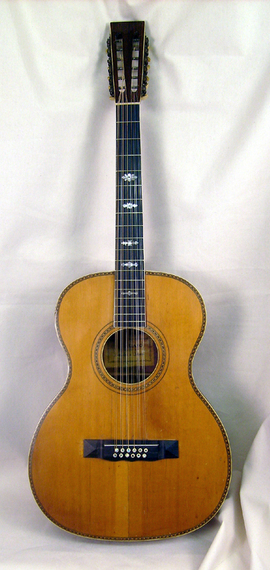Hey, it’s Monday again—must be the time for the Monday Morning Blues!
We’re back today with our ongoing feature about famous blues guitars, & today’s instrument is really iconic. If you’ve ever studied blues history at all, you know that the Stella brand of guitars was one of the most popular among pre-war blues guitarists. The list of players who used some form of Stella is formidable, & includes such names as Charlie Patton, Blind Blake, Willie Brown, Sleepy John Estes, Buddy Boy Hawkins, “Bo Weavil” Jackson, & Blind Lemon Jefferson, just to name some well-known musicians for whom a Stella guitar was a main instrument.
But if you’re looking at blues musicians who played 12-string, even a higher percentage favored Stellas! Such noteworthy players as Blind Willie McTell, Barbecue Bob, Charley Lincoln (AKA “Laughing Charlie”), Charlie “Dad” Nelson, Jim Jackson (composer of “Kansas City Blues") & of course, Leadbelly all used Stella 12-strings of various shapes & sizes as their regular ax for much of their careers.
Perhaps the most unusual example of a Stella 12-string in the hands of a well-known blues musician involves Skip James. As I understand (from info on the Early Blues site), James used a Stella 12-string re-strung as a 6-string on his 1931 recordings of such masterpieces as “Devil Got My Woman,” “Hard Times Killing Floor” & “Special Rider Blues.” This seems a rather mind-boggling fact.
However, usually when a musician has a 12-string he wants it for all the jangling resonance, as well as the added natural amplification, which in fact make it a great instrument for an street performer or for someone playing without amplification in a noisy “jook joint.” In addition, some of the bigger Stella models allowed for a lower tuning than standard—Leadbelly’s Stella was, I believe, pitched either a third or a fourth lower than a standard guitar. Also, while a 12-string may not be the first instrument you think of when you think about slide guitar, no less of a slide master than Blind Willie McTell played one, & Barbecue Bob also played some slide on his Stella 12-string.
Now there’s a lot of talk about the relative costs of guitars played by the pre-war country bluesmen. One school of thought stresses that they could get a great sound out of relatively cheap instruments, while others conversely stress the higher quality of these older guitars. It’s true that the Stellas most people see nowadays are Stellas built by the Harmony Company after they bought out the brand in 1939—& in fact, most of what you see are Harmony Stellas from the 1950s & 1960s. & it’s fairly certain that the Stellas of the 1920s & 1930s were substantially different from the later Harmony models.
I decided to do a bit of dime store research & found that a Stella Jumbo 12-string retailed for $28 in 1925. Using an online conversion utility, I found that this would convert to $345.24 in current dollars. In other words, the price of a decent student model guitar—something that can sound pretty good, but is very far from a professional model. As a point of comparison, I looked up the prices of some Gibson guitars from the same period & found that a Gibson L1 retailed for $50 in 1926, & that this would convert to $610.40 in 2011 currency. Now you’re getting into an intermediate price. Meanwhile, a 1928 Gibson Nick Lucas retailed for $125, & this would be the equivalent of $1,576.04 in current dollars—in other words, getting into the realm of professional prices, but really on the low end of that range.
My conclusion: you got a lot more guitar bang for your buck in the 1920s! Anyway, hope you enjoy these two great songs played on Stella 12-strings by Leadbelly & Blind Willie McTell!
Image leading off post shows a 1930 Stella 12-string. Image links to its source.

These are brilliant posts John. I think I've said it before, but you entertain and educate me!
ReplyDeleteAhhhhh, another great start to my day. Thanks, John!
ReplyDeleteHi Titus & Roy
ReplyDeleteTitus: That's so great--I really appreciate that response! Thanks!
Roy: Glad you enjoyed them!
Enjoyed both of these, especially the second one.
ReplyDeleteCongrats on getting to play old-time music in Portland :) I hope there will be many more opportunities (and videos here!)
Hi HKatz: Yes, "Mama Tain't Long Fore Day" is a truly great song! Thanks for the good wishes. Things are coming together, tho it's a slow process. I appreciate the support!
ReplyDelete